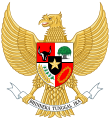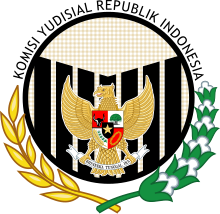
The politics of Indonesia take place in the framework of a presidential representative democratic republic whereby the President of Indonesia is both head of state and head of government and of a multi-party system. Executive power is exercised by the government. Legislative power is vested in both the government and the bicameral People's Consultative Assembly. The judiciary is independent of the executive and the legislature.

The term Government of the Republic of Indonesia can have a number of different meanings. At its widest, it can refer collectively to the three traditional branches of government – the executive branch, legislative branch and judicial branch. The term is also used colloquially to mean the executive and legislature together, as these are the branches of government responsible for day-to-day governance of the nation and lawmaking. At its narrowest, the term is used to refer to the executive branch in form of the Cabinet of Indonesia as this is the branch of government responsible for day-to-day governance.

The 1945 State Constitution of the Republic of Indonesia is the supreme law and basis for all laws of Indonesia.

The Supreme Court of the Republic of Indonesia is the independent judicial arm of the state. It maintains a system of courts and sits above the other courts and is the final court of appeal. It can also re-examine cases if new evidence emerges.
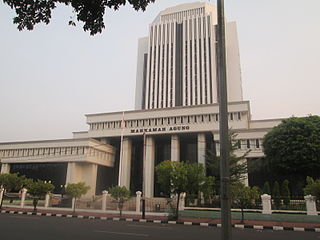
The Judiciary of Indonesia constitutionally consists of the Supreme Court of Indonesia, the Constitutional Court of Indonesia, and the lesser court system under the Supreme Court. These lesser courts are categorically subdivided into the public courts, religious courts, state administrative courts, and military courts.

The Constitutional Court of the Republic of Indonesia is one of the apex courts in Indonesia along with the Indonesian Supreme Court. Its primary role is reviewing the constitutionality of Acts (undang-undang). It also has other functions, including resolving disputes over the powers of state institutions, settling disputes over the results of general elections, deciding on the dissolution of political parties, and supervising impeachment. The last two functions have never been exercised by the Court.

Patrialis Akbar is an advocate and politician who was member of the Constitutional Court Justice of the Indonesian Constitutional Court for the period 2013–2017 from Padang, West Sumatra. He has a complete career in three branches of state, legislative, executive and judicial power. He had served as a member of the House of Representatives for two periods.
Harjono is a former judge of the Constitutional Court of Indonesia. He has remained vocal on judicial affairs in Indonesia even after his retirement, expressing support for public humiliation as a punishment for people convicted of graft. In 2016, he also appeared before the Constitutional Court again to testify in favor Jakarta Governor Basuki Tjahaja Purnama's case for the right of incumbent politicians to not take leaves of absence during campaign seasons.
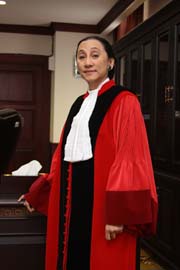
Maria Farida Indrati is a former justice of the Constitutional Court of Indonesia for two terms. During her both terms, she was the only woman among the Court's nine members.
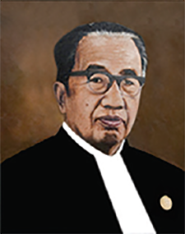
Wirjono Prodjodikoro was the head justice of the Indonesian Supreme Court from 1952 to 1966.

Dr. Sahardjo LL.B., was a National Hero and Minister of Justice of Indonesia during the First, Second, and Third Working Cabinets.

The National Judicial Appointments Commission (NJAC) was a proposed body which would have been responsible for the recruitment, appointment and transfer of judicial officers, legal officers and legal employees under the government of India and in all state governments of India. The commission was established by amending the Constitution of India through the 99th constitution amendment with the Constitution (Ninety-Ninth Amendment) Act, 2014 or 99th Constitutional Amendment Act-2014 passed by the Lok Sabha on 13 August 2014 and by the Rajya Sabha on 14 August 2014. The NJAC would have replaced the collegium system for the appointment of judges as invoked by the Supreme court via judicial fiat by a new system. Along with the Constitution Amendment Act, the National Judicial Appointments Commission Act, 2014, was also passed by the Parliament of India to regulate the functions of the National Judicial Appointments Commission. The NJAC Bill and the Constitutional Amendment Bill, was ratified by 16 of the state legislatures in India, and subsequently assented by the President of India Pranab Mukherjee on 31 December 2014. The NJAC Act and the Constitutional Amendment Act came into force from 13 April 2015.
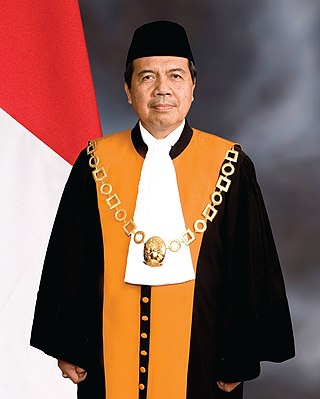
The chief justice of the Supreme Court of Indonesia is the head of the Supreme Court of Indonesia.
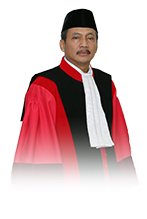
The chief justice of the Constitutional Court of Indonesia is the head of the Constitutional Court of Indonesia.
Arief Hidayat was the fifth Chief Justice of the Constitutional Court of Indonesia. Previously, he was a professor of law at his alma mater, Diponegoro University.
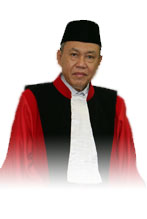
Wahiduddin Adams is currently a justice of the Constitutional Court of Indonesia. He and Aswanto were appointed to the court by the People's Representative Council in March 2014. Adams formerly served as Director General of Legislation at the Ministry of Law and Human Rights.
Ahmad Fadlil Sumadi is a former judge on the Constitutional Court of Indonesia. Sumadi initially served as the registrar of the Constitutional Court between 2003 and 2008, then served as the deputy chief justice of the High Court of Yogyakarta before the Supreme Court of Indonesia appointed him to the Constitutional Court in 2010.

Suhartoyo is currently the Chief Justice of the Constitutional Court of Indonesia, a position that he has held since November 2023. He ascended to the leadership of the Court following the demotion of Anwar Usman after the Court's Honorary Council found that he had committed ethical violations, which cleared the way for President Joko Widodo’s eldest son to run for vice president in 2024.
The Indonesian Judges Association, known locally as Ikatan Hakim Indonesia or IKAHI is an association of judicial officials in Indonesia. IKAHI's members include first-level trial judges and senior justices, as opposed to the Indonesian Judges' Forum (FDHI) which includes appeals court judges. IKAHI executive Suhadi has described the association's focus as protection of judges from threats and harassment, though judicial transparency activists have disputed this.

I Dewa Gede Palguna is a constitutional law academic who served two terms as a justice of the Constitutional Court of Indonesia. He holds the record for having been the youngest ever justice of the Indonesian Constitutional Court. In February 2020, he was appointed to the ethics council of Indonesia's Child Protection Commission.
